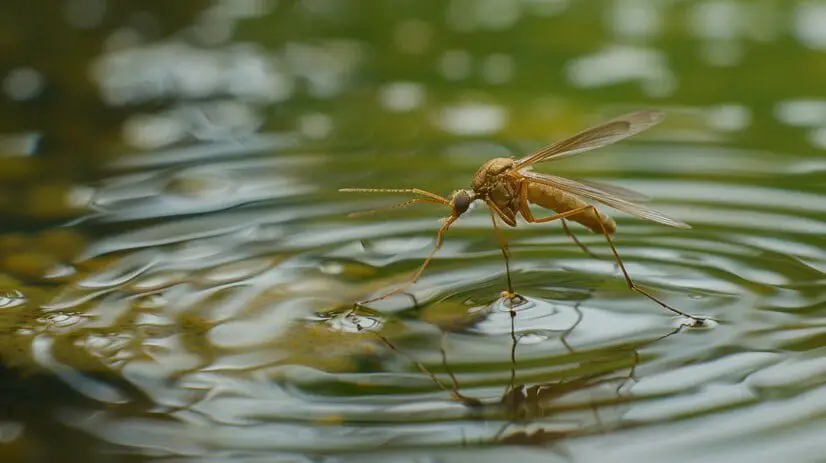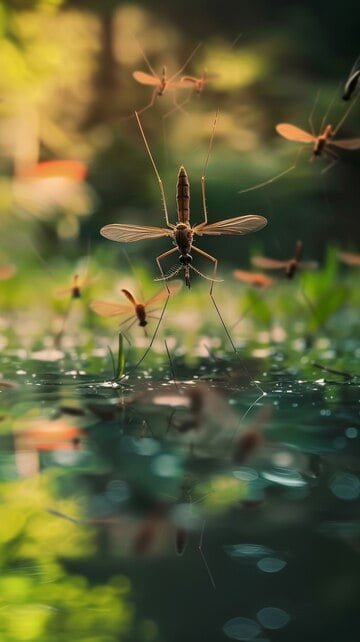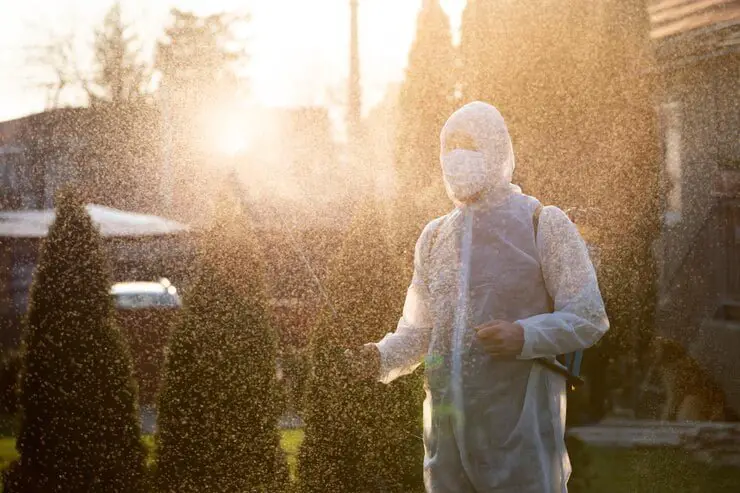Table of Contents
How to Get Rid of Water Bugs
Introduction of Water Bugs
Water bugs, often called “giant water bugs” or “electric light bugs,” are aquatic insects that can become a significant nuisance if they enter your home. Although they are usually found outdoors in ponds, lakes, or other bodies of water, they can sometimes go indoors, especially if there is a water source. These pests are often mistaken for cockroaches, but they have distinct differences and require specific methods to remove. Below is a detailed guide on how to get rid of water bugs effectively.
Water bugs, often confused with cockroaches, can be a nuisance in homes, particularly in areas with high humidity or near water sources. Their presence can be alarming, but with the right strategies, you can effectively eliminate them and prevent their return. In this article, we will discuss what water bugs are, how to identify them, and various methods to get rid of them, along with tips for prevention.
What Are Water Bugs?
Water bugs refer to a few different species, but they commonly include:
- Giant Water Bugs: Also known as Belostomatidae, these insects are large and can be found in freshwater bodies. They are not harmful to humans but can deliver a painful bite.
- Cockroach Water Bugs: This term often refers to cockroaches that thrive in damp environments, particularly the American cockroach.
Understanding what type of water bug you are dealing with is essential for choosing the right extermination method.
Signs of Water Bug Infestation
Identifying a water bug infestation early can help in managing the problem effectively. Look for these signs:
- Sightings: Spotting water bugs, especially at night, is the most obvious sign of an infestation.
- Feces: Dark, cylindrical droppings resembling coffee grounds or black pepper can indicate their presence.
- Egg Casings: Water bugs lay eggs in clusters. Finding these casings can signal that they are breeding in your home.
- Unpleasant Odors: A musty smell may indicate a large infestation.


1. Identify water sources and eliminate them.
Water bugs are attracted to moist environments, so controlling and eliminating sources of moisture is critical to preventing and eliminating them.
- Fix Leaks: Start by inspecting your home for any leaking pipes, faucets, or appliances. Even small leaks can create enough moisture to attract water bugs. Repairing these leaks is a fundamental step in removing their water supply and making your home less attractive to them.
- Dry wet areas: Basements, bathrooms, kitchens, and laundry rooms are prone to high humidity levels, which can breed water bugs. Use dehumidifiers in these areas to keep humidity levels low. Additionally, fans can help circulate air and dry any wet spots.
- Remove Standing Water: Check both the inside and outside of your home for standing water. Water can collect in plant trays, pet water bowls, gutters and other areas. Empty these containers regularly or place them where they do not collect water.
2. Seal entry points to get rid of water bugs.
Water bugs can enter your home through various cracks, gaps, and holes. By sealing these entry points, you can prevent them from getting in.
- Seal Gaps: Carefully inspect the exterior of your home for any cracks or gaps in the foundation, walls, windows, and doors. Use caulk or weather stripping to seal these holes. Pay special attention to areas where pipes or utility lines enter the home, as these are common entry points for water bugs.
- Screen vents and drains: Vents and drains can provide easy access for water bugs, especially in basements and kitchens. Placing fine mesh screens over these openings can help prevent their entry without restricting airflow or drainage.
3. Maintain a clean home environment
A clean house is less attractive to water bugs, as it eliminates potential food sources and breeding grounds.
- Regular cleaning: Keep your home, especially the kitchen and bathroom, clean and free of food debris. Sweep and dust floors regularly, clean countertops, and make sure no crumbs or spills are left behind. Cleaning under appliances and furniture is also important, as these hidden areas can trap food particles and moisture.
- Proper food storage: Store all food in airtight containers to prevent water bugs from getting to it. This includes pantry items, pet food, and food left on countertops. Additionally, take out the trash regularly and make sure trash cans are tightly closed.
How to get Rid of Water Bugs
4. Use natural remedies to get rid of water bugs.
Natural remedies can be an effective and safe alternative to chemical pesticides, especially if you have pets or small children in your home.
- Boric Acid: Boric acid is a common and effective insecticide that can be used to kill aquatic insects. When ingested, it disrupts their digestive system and eventually kills them. Sprinkle boric acid powder in areas where water bugs are frequent, such as under the sink, around baseboards, and in cracks and crevices. Be careful when using boric acid around pets and children, as it can be harmful if ingested.
- Essential oils: Some essential oils, such as peppermint, eucalyptus, and tea tree oil, are known to repel insects, including water bugs. To make a natural repellant, mix a few drops of essential oil with water in a spray bottle and apply to entryways, baseboards and other places where water bugs may enter or gather.
- Diatomaceous Earth: Diatomaceous Earth is a natural, non-toxic powder made from the fossilized remains of diatoms. It works by absorbing the oils and fats from the insects’ secretions, causing them to dehydrate and die. Spread a thin layer of diatomaceous earth around your home, in cracks and crevices, and other places where water bugs are present. Safe to use around pets and children, but avoid inhaling dust.
5. Apply insecticide to get rid of water bugs.
If natural remedies aren’t enough, pesticides can provide a more powerful solution to eliminating water bugs. Choose an insecticide that is specifically labeled for water bugs and follow the manufacturer’s instructions carefully.
- Indoor insecticides: For indoor use, choose an insecticide that is safe for indoor use and target areas where water bugs are commonly found, such as under sinks, along baseboards. , in cabinets, and behind appliances. Some pesticides come in spray form, while others are available as bait stations or powders. Bait stations can be particularly effective, as they attract water bugs to the poison, which they then carry to their nests, effectively targeting the entire colony.
- Outdoor Treatment: If water bugs are entering your home from the outside, consider treating the perimeter of your home with an outdoor insecticide. Apply insecticide around the foundation, along window and door frames, and in any cracks or gaps in exterior walls. Additionally, treating areas where water bugs are likely to breed, such as around ponds, drainage ditches, or other bodies of water near your home, can help reduce their population. are
6. Professional pest control
If the infestation is severe or if you have tried the above methods without success, it may be time to call a professional pest control service. Pest control experts can predict the extent of an infestation and use more powerful treatments that are not available to the general public.

- Diagnosis: A professional will conduct a thorough inspection of your home to identify the source of the infestation and contributing factors, such as water sources or entry points.
- Treatment Plan: Based on their diagnosis, a pest control specialist will develop a treatment plan tailored to your specific situation. This may include a combination of chemical treatment, physical barriers, and ongoing monitoring to ensure complete eradication of the infection.
- Follow-up: Many pest control companies offer follow-up visits to make sure the treatment was effective and to address any remaining problems. They can also give advice on how to prevent future infections.
By following these detailed steps, you can effectively get rid of water bugs and prevent them from returning to your home. Consistency and thoroughness in addressing moisture problems, sealing entry points, maintaining cleanliness, and using appropriate treatments will be key to your success.
Preventing Future Infestations
After getting rid of water bugs, it’s essential to implement preventive measures:
- Maintain Cleanliness: Keep your home clean and free of food debris.
- Monitor for Signs: Regularly check for signs of water bugs and take immediate action if you spot any.
- Moisture Control: Reduce humidity in your home by using dehumidifiers, fixing leaks, and ensuring proper ventilation.
Harmful Water Bugs for Human
Water bugs, particularly giant water bugs, can pose several risks to humans, despite often being misunderstood and mistaken for cockroaches. Here’s a detailed overview of the potential dangers associated with these insects:
1. Bites
One of the most immediate concerns with giant water bugs is their ability to bite. These insects possess strong forelegs designed for grasping prey, which they can also use defensively if they feel threatened. When a giant water bug bites a person, it can lead to intense pain, described as a burning sensation at the site of the bite. The area may become red, swollen, and tender, and in some cases, there could be minor bleeding. Although serious allergic reactions to their bites are uncommon, the discomfort can be significant and distressing.
2. Allergic Reactions
While not everyone is affected, some individuals may experience allergic reactions to bites from water bugs or even their presence in the environment. Symptoms can range from mild itching and redness to more severe reactions, such as hives or respiratory difficulties. This is particularly concerning for people with pre-existing sensitivities to insect bites or stings, who may be at a greater risk of adverse reactions
3. Disease Transmission
True water bugs, including giant water bugs, are generally not vectors for serious diseases like some other insects (e.g., mosquitoes). However, they can carry pathogens from the water and organic debris they inhabit. This means that if they come into contact with food, kitchen surfaces, or food preparation areas, there’s a potential risk for contamination. While the overall risk of disease transmission from water bugs is low compared to other pests, it remains a consideration for hygiene in homes and food preparation settings
4. Psychological Impact
The mere presence of water bugs can cause distress and anxiety among homeowners. Their large size and unusual appearance can be unsettling, leading to discomfort and fear about potential infestations. This psychological impact can result in heightened stress levels, especially for individuals who may have a phobia of insects or general anxiety about pests
5. Competition for Resources
In natural ecosystems, giant water bugs serve as predators, feeding on various aquatic organisms, including fish and amphibians. Their presence in ponds, lakes, and streams can disrupt local food chains by preying on these smaller animals. This predation can lead to imbalances in aquatic ecosystems, potentially affecting local fisheries and biodiversity. While this is more of an ecological concern than a direct threat to humans, it highlights the role of water bugs in their environments
In Summary Although giant water bugs do not typically pose a significant threat to human health, their bites can be painful, and they may carry pathogens. Awareness and preventive measures can help minimize encounters with these insects. If a bite occurs, it’s important to clean the wound thoroughly and seek medical advice if symptoms worsen or do not improve. Understanding the behavior and habitat of water bugs can aid in effectively managing their presence and reducing potential risks.
Conclusion: How to get rid of water bugs
Finally, effectively ridding your home of water pests requires a comprehensive and systematic approach that addresses both the root causes and the immediate presence of these pests. By eliminating sources of moisture, sealing entry points, maintaining a clean environment, and using both natural and chemical treatments, you can significantly reduce the chances of a water bug infestation. For persistent or severe cases, professional pest control services offer the expertise and resources necessary to eradicate the problem completely. By taking proactive steps and being vigilant, you can create a home environment that is less attractive to water bugs and ensure that these unwanted pests do not return. Read More
Here’s a comprehensive FAQ section related to getting rid of water bugs:
FAQ: Getting Rid of Water Bugs
1. What are water bugs?
Water bugs commonly refer to several species, including giant water bugs and cockroach-like pests that thrive in damp environments. They are often confused with cockroaches but belong to different families.
2. Are water bugs harmful to humans?
While water bugs can bite if threatened, their bites are not generally dangerous to humans. However, they can cause painful reactions and may trigger allergies in some individuals.
3. How can I tell if I have a water bugs infestation?
Signs of a water bug infestation include:
- Sightings of water bugs, especially at night.
- Dark, cylindrical droppings resembling coffee grounds or black pepper.
- Egg casings found in clusters.
- A musty odor in areas where they are prevalent.
4. What are some effective natural remedies for getting rid of water bugs?
Several natural remedies include:
- Boric acid: Effective as a stomach poison when ingested by water bugs.
- Diatomaceous earth: Damages the exoskeleton, causing dehydration.
- Essential oils: Oils like peppermint and tea tree oil can repel water bugs.
- Soap and water spray: Creates a suffocating film when sprayed directly on the bugs.
- Baking soda and sugar: Attracts and kills water bugs when ingested.
5. How do I prevent water bugs from entering my home?
To prevent water bugs:
- Seal cracks and gaps around windows, doors, and foundations.
- Maintain cleanliness by regularly cleaning and decluttering.
- Fix any plumbing leaks and reduce humidity levels with dehumidifiers.
6. Can I use commercial pesticides to eliminate water bugs?
Yes, commercial pesticides can be effective for severe infestations. Look for insecticides labeled specifically for water bugs or cockroaches and follow the manufacturer’s instructions carefully.
7. How long does it take to get rid of water bugs using natural methods?
The time it takes to eliminate water bugs using natural methods can vary based on the level of infestation. Some methods may show results within a few days, while others may take longer, particularly if you are addressing an ongoing issue.
8. What should I do if natural remedies do not work?
If natural remedies do not yield results, consider contacting a professional pest control service. They can assess the situation and provide targeted treatments that are more effective for severe infestations.
9. Are there any health risks associated with using natural remedies?
Most natural remedies are safe for humans and pets when used as directed. However, always use caution and read labels, especially when using substances like boric acid and essential oils, which can cause irritation if not handled properly.
10. What is the best overall strategy for managing water bugs?
A comprehensive approach that combines cleanliness, sealing entry points, and using natural remedies is the most effective strategy for managing water bugs. Regular monitoring and prompt action upon seeing signs of water bugs can also help keep them at bay.
This FAQ section addresses common concerns and questions about water bugs and their management, providing useful information for readers looking to address this pest problem effectively.

Your article helped me a lot, is there any more related content? Thanks!